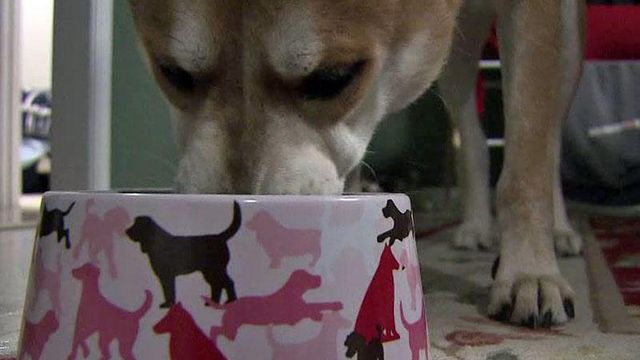Experts answer questions about dog food quality
Some pet owners worry the food they feed their dogs will make them sick. Many end up calling the nutrition lab at the North Carolina State University's Veterinary School.
Posted — Updated"There’s a lot of misperceptions out there," N.C. State nutrition expert Dr. Korinn Saker said.
Saker and her team have heard from pet owners concerned about contamination in dog food, and some have even asked if commercial dog foods contain roadkill.
Saker advises people not to believe everything they read.
"There may be some little bit of truth in that but usually not," She said.
The nutrition lab gives out advice, develops diets and evaluates labels on dog food.
"Labeling is very clever," Saker said, noting that it is important to read the fine print. "The nutrition claim on the label can be very difficult to find."
Consumers should look for a label that says the food has been tested by the Association of American Feed Control Officials.
"If it goes through animal feeding tests, you know that not only is the formulation appropriate, but the ingredients are going to be safe," she said.
Another concern from dog owners is the use of byproducts in dog food, but Saker said owners shouldn't be afraid.
"There’s no hair. There’s no hoof. There’s no hide, anything like that in there," she said.
Overall, Saker and her team have looked at a lot of dog food.
"We haven’t yet, I don’t think, come across a diet that’s going to be dangerous to the pet," she said.
Veterinarian Diane Deresienski believes it's not the type of food but, rather, how much that can be the problem for animals.
"The main thing you can do for your dog when you’re feeding them is keep them on the thin side," she said. "That’s actually been shown to increase their lifespan by a year to a year-and-a-half."
Deresienski said dogs involved in the testing of food get two hours of exercise a day. Most dogs don't get that much exercise, so they need less calories than what is recommended on the bag, she said.
Saker said owners don't necessarily have to purchase the most expensive bagged food for their pet. She said it is important to get the right food for the stage in the dog's life.
She also recommends looking for the first ingredient in the food to be meat.
Some dogs don't eat bagged food at all.
Fran Ferrell feeds her dog a homemade diet consisting of steamed broccoli, a carefully measured amount of chicken, raw carrots, rice and fruit.
Ferrell switched her dog, Lucky, to the diet after he had years of skin problems and seizures.
"That was one of the main things when we switched to this diet. We know exactly what’s in it," she said.
The danger of a homemade diet is that it might not be balanced with the right vitamins and minerals.
Ferrell sprinkles a supplement on Lucky's food to make sure he stays healthy.
At 11 years old, he's thriving.
"(He's) very energetic, as energetic as a somewhat older man can be," Ferrell said.
Homemade diets are growing in popularity and N.C. State's nutrition lab helps dog owners balance those diets.
Saker said that while some owners worry that their dogs get bored eating the same food every day, a dog's gastrointestinal tract does better on a regular diet.
• Credits
Copyright 2024 by Capitol Broadcasting Company. All rights reserved. This material may not be published, broadcast, rewritten or redistributed.






